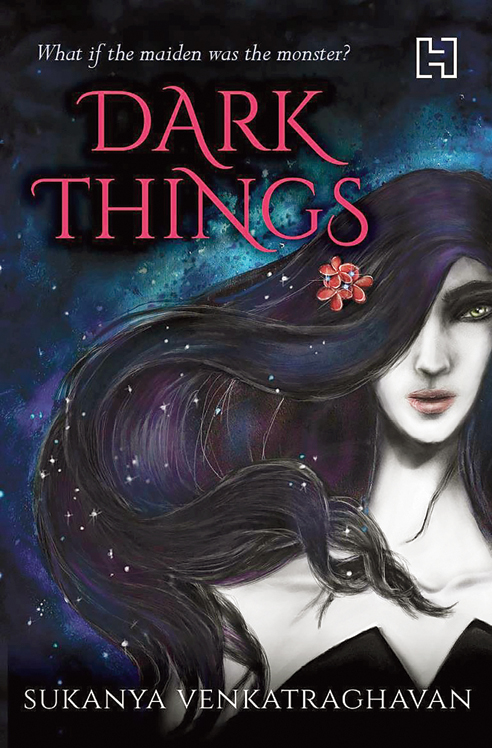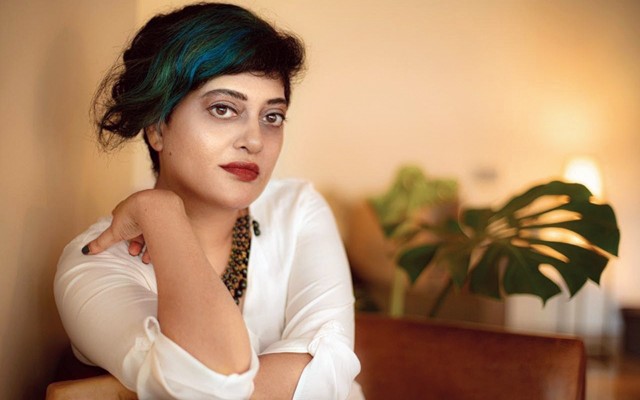Mooooooon, my 21-month-old, squeals. I look up from my book slightly baffled since it is broad daylight. Katha knows where to look for the moon at twilight, when she is sleepy and hazy in the sky. Katha knows and loves the moon in all her phases, just like her mother. Moooooooooon she goes again and I get up to check. Our bedroom wall is painted a midnight blue and there is a narrow ledge behind the bed. I stare at what my daughter is staring at — a day-old water ring, crescent-shaped, half-drying, left by one of the water bottles that are always lying around. Moon, I echo with her. She is pleased. She likes finding moons in unexpected places and things. Just like her mother.
Just like her mother. Despite the fact that we are not connected by biology. Because that’s what you usually hear about children and their parents — she is just like you. Looks like you. Sings like you. Frowns like you. Fights like you…
Where biology is not a factor, synchronicity steps in. That’s how the universe works. I am going to save the opus on adoption for another time. Because no matter how a child enters your life, the adventure of parenthood follows a universal roadmap with individual detours. We are naturally tuned to worry about the big things — nutrition, development, the right school, the right friends, the right values, manners… the list is endless. Seldom are we told to focus on the little things. Seemingly little things.
And the little things sometimes fall into place. They answer the call of serendipity. They understand the language of synchronicity (yes my favourite word). How else can you explain my moon-mad child? Her obsession with apattaa (butterfly). How did she know her mother chased butterflies endlessly as a child? How she already death stares people she doesn’t like and instantly claims the ones she does with her smile? How we already have a secret language or how I can see language in her babbling?
How I am every mother.
She is a toddler just now, discovering something wonderful and magnificent every day, spitting out what she doesn’t like with definite disdain. I can see her invisible wings, her fire, her flaws. Like me, she isn’t afraid of the dark. I can see how she will be so much like me as she grows. And how she will not be anything like me. Just like I am so much like my mother and yet nothing like her.
I owe it to my child that I do not obsess about this. And in the absence of biology and its rules, we have the chance to create our own legacy of just-like-me and so-not-like-me. Invisible chords are already at work, binding mother and daughter in myriad tapestries of likeness and individuality. Inheritance here is an act of conscious choice and unconscious connection. It is made in the now, not in the lanes of memory, bloodlines or ancestry.
Like the moon we will have our phases, I know. There will be spaces of void when we will not get each other, our understanding is bound to wax and wane and then there will also be sudden full blooms of beauty, experiences and empathy.
Now is also when I am a pandemic mom raising a pandemic toddler. Here again, I am every mother. I worry about Katha’s stranger anxiety, the lack of fresh air, open spaces, healthy interaction with other children. I stress about her screen time and lack of physical activities. I spend sleepless nights fearing the worst and the shadows of loss and grief flit about darkly. On other days I go back to worrying about the little big things. I wonder when she will see her next butterfly because there doesn’t seem to be any in the building lobby she plays in right now. I dream of the day I can show her fish as they swim and she will see that they are not wonky angled appattas.
We were at the park a few months ago and she unexpectedly looked up at the twilight sky and said “ball”. She meant the full moon. I look forward to the next time we can be somewhere with an inky twinkly sky above us dotted with a moon. Until then we have crescent-shaped water circles in unexpected places.

Sukanya Venkatraghavan is the author of Dark Things and Magical Women published by Hachette India

